Related Research Articles
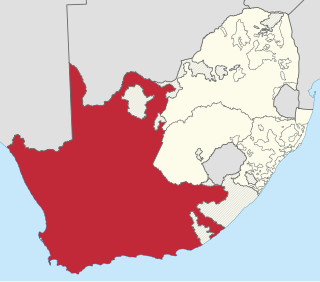
The Province of the Cape of Good Hope, commonly referred to as the Cape Province and colloquially as The Cape, was a province in the Union of South Africa and subsequently the Republic of South Africa. It encompassed the old Cape Colony, as well as Walvis Bay, and had Cape Town as its capital. In 1994, the Cape Province was divided into the new Eastern Cape, Northern Cape and Western Cape provinces, along with part of the North West.
The Progressive Party was a liberal party in South Africa which, during the era of apartheid, was considered the left wing of the all-white parliament. The party represented the legal opposition to apartheid within South Africa's white minority. It opposed the ruling National Party's racial policies, and championed the rule of law. For 13 years, its only member of parliament was Helen Suzman. It was later renamed the Progressive Reform Party in 1975, and then Progressive Federal Party in 1977. The modern Democratic Alliance considers the party to be its earliest predecessor.

Lawrence Hill is a Canadian novelist, essayist, and memoirist. He is known for his 2007 novel The Book of Negroes, inspired by the Black Loyalists given freedom and resettled in Nova Scotia by the British after the American Revolutionary War, and his 2001 memoir Black Berry, Sweet Juice: On Being Black and White in Canada. The Book of Negroes was adapted for a TV mini-series produced in 2015. He was selected in 2013 for the Massey Lectures: he drew from his non-fiction book Blood: The Stuff of Life, published that year. His ten books include other non-fiction and fictional works, and some have been translated into other languages and published in numerous other countries.
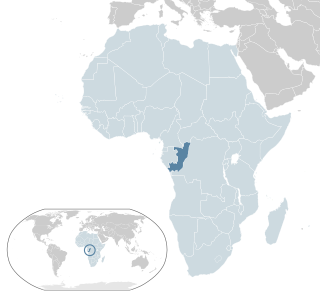
Lesbian, gay, bisexual, transgender, and queer (LGBTQ) people in the Republic of the Congo face legal challenges not experienced by non-LGBTQ residents. Both male and female expressions of homosexuality are legal in the Republic of the Congo, but same-sex couples and households headed by same-sex couples are not eligible for the same legal protections available to opposite-sex couples, with reports of discrimination and abuses towards LGBTQ people.

Day labor is work done where the worker is hired and paid one day at a time, with no promise that more work will be available in the future. It is a form of contingent work.
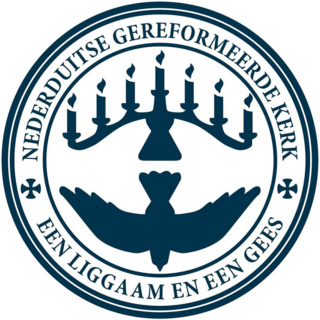
The Dutch Reformed Church is a Reformed Christian denomination in South Africa. It also has a presence in neighbouring countries, such as Namibia, Eswatini, and parts of Botswana, Zimbabwe and Zambia. In 2013 it claimed 1.1 million members and 1,602 ordained ministers in 1,158 congregations.
The King David Schools are a network of Jewish day schools in Johannesburg, South Africa, offering nursery through high school education. There are three campuses across Johannesburg: Linksfield, Victory Park, and Sandton; "each school has an atmosphere of its own serving the specific community". The schools are under the auspices of the South African Board of Jewish Education.
The Bantu Men's Social Centre, founded in 1924 in Johannesburg, South Africa, played social, political, and cultural roles in the lives of black South Africans.
Lionello Levi Sandri was an Italian politician and European Commissioner.

Mauritius is the only African Union country where Hinduism is the dominant religion, with about 50% of the population as followers in 2011. Hinduism is the second largest religion in Réunion (6.7%) and Seychelles (5.4%).

The African Union (AU) is a continental union of 55 member states located on the continent of Africa. The AU was announced in the Sirte Declaration in Sirte, Libya, on 9 September 1999, calling for the establishment of the African Union. The bloc was launched on 9 July 2002 in Durban, South Africa. The intention of the AU was to replace the Organisation of African Unity (OAU), established on 25 May 1963 in Addis Ababa by 32 signatory governments; the OAU was disbanded on 9 July 2002. The most important decisions of the AU are made by the Assembly of the African Union, a semi-annual meeting of the heads of state and government of its member states.
The United Nations Sustainable Development Group (UNSDG), previously the United Nations Development Group (UNDG), is a group of 36 United Nations funds, programmes, specialized agencies, departments and offices that play a role in development. It was created by the Secretary-General of the United Nations in order to improve the effectiveness of United Nations development activities at the country level.
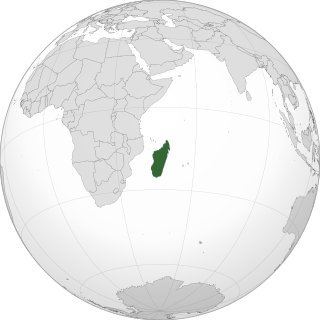
Lesbian, gay, bisexual, transgender, and queer (LGBTQ) people in Madagascar face discrimination and legal challenges not experienced by non-LGBTQ residents. While same-sex sexual activity is legal among individuals above the age of 21, most civic liberties such as the rights to get married and adopt children are not afforded to LGBTQ individuals.
Sino-Third World relations refers to the general relationship between the two Chinese states across the Taiwan Strait and the rest of the Third World.

The legal status of polygamy varies widely around the world. Polygamy is legal in 58 out of nearly 200 sovereign states, the vast majority of them being Muslim-majority countries. Some countries that permit polygamy have restrictions, such as requiring the first wife to give her consent.
The Progressive Party of the Cape Colony was a political party in the Cape Parliament that was primarily composed of and supported by white immigrants to the Cape. It supported pro-imperialist policies, and was in power from 1900 until 1908.
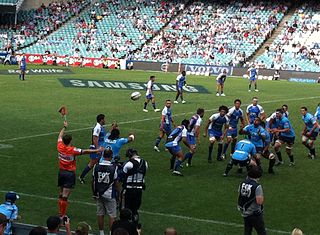
The 2014 Super Rugby season is the fourth season of the 15-team format for the Super Rugby competition involving teams from Australia, New Zealand and South Africa. For sponsorship reasons, this competition is known as Asteron Life Super Rugby in Australia, Investec Super Rugby in New Zealand and Vodacom Super Rugby in South Africa. Including its past incarnations as Super 12 and Super 14, this is the 19th season for the Southern Hemisphere's premier transnational club competition. The conference games will take place every weekend from 15 February until 12 July, followed by the finals series, culminating in the grand final on 2 August. The winners of the 2014 Super Rugby Season were the New South Wales Waratahs.
The 2016 Super Rugby season was the 21st season of Super Rugby and the first season featuring an expanded 18-team format. It was also the first season that teams outside Australia, New Zealand and South Africa featured, with the Jaguares from Argentina and the Sunwolves from Japan taking part. This season also saw the return of the Kings, who competed just once before, in the 2013 Super Rugby season. The round-robin games took place every weekend from 26 February to 16 July 2016, followed by the finals series at the end of July and culminating in the final on 6 August.
The 2015 Super Rugby season was the 20th season of Super Rugby and the fifth season featuring an expanded 15-team format. For sponsorship reasons, this competition was known as Asteron Life Super Rugby in Australia, Investec Super Rugby in New Zealand and Vodacom Super Rugby in South Africa. The round-robin matches took place every weekend from 13 February until 13 June, followed by the finals series and culminating in the final on 4 July. This was the final season that featured a 15-team format.
References
- ↑ "Archived copy" (PDF). www.africa-union.org. Archived from the original (PDF) on 1 December 2005. Retrieved 14 January 2022.
{{cite web}}: CS1 maint: archived copy as title (link)